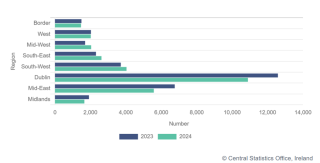CSO’s Q4 2024 New Dwelling Completions Data Highlights Ongoing Supply Struggles
The latest data from the Central Statistics Office (CSO) highlights a concerning decline in Ireland’s housing supply. New dwelling completions in 2024 dropped by almost 7 per cent compared to 2023. This trend raises pressing questions about the construction sector’s capacity, the impact of the declining completions on future supply, and the likelihood of achieving the new Programme for Government’s commitment to delivering an average of 50,000 homes annually from 2025 to 2030.
2024 Dwelling Completions Data: Challenges and Implications
According to the CSO, a total of 30,330 new dwellings were completed in 2024, representing a 6.7 per cent decrease from 2023. The breakdown by housing type is as follows:

The decline in apartment completions by 24.1 per cent is particularly concerning, given the crucial role of these multi-unit developments in urban housing supply and in meeting overall housing delivery targets. This downturn may signal broader issues, including construction sector capacity constraints, rising construction costs, viability concerns for developers, and delays in planning approvals. With the average household size decreasing, multi-unit developments such as apartments will become increasingly essential in meeting diverse housing needs. If this trend continues, it could further limit housing availability in key urban areas, exacerbating affordability pressures and failing to align with demographic shifts. Additionally, recent trends in planning permissions indicate a decline, suggesting that the pipeline for future housing supply may be constrained.

GIVING A VOICE TO THOSE
WHO DON’T HAVE A VOICE
When you support Social Justice Ireland, you are tackling the causes of problems.
Regional Variations in Housing Delivery
The data also highlights regional variations in new dwelling completions. Urban areas saw the majority of developments, comprising 85 per cent of total completions (25,834 units), while rural areas accounted for only 4,496 units. Notably, Dublin remained the dominant region, contributing 36 per cent of all new completions (10,892 units).

This concentration in urban centres raises concerns about future growth and adaptability. Policies need to shift from reacting to population growth with infrastructure development to proactively planning for settlements. Guiding population growth in a balanced and sustainable way, while designing infrastructure with the capacity to adapt to future changes in population, technology, and environmental conditions, will ensure long-term sustainability. Moreover, facilitating more balanced regional development over the medium to long term is crucial. A coordinated approach, integrating IDA and Enterprise Ireland planning, into infrastructure and housing strategies is essential as this would help support job creation across regions, promote economic growth beyond Dublin, and facilitate more equitable housing development.
Without urgent policy intervention, constraints in construction capacity and planning approvals could further reduce supply, deepening Ireland’s housing crisis. A strategic response is needed to ensure that housing delivery keeps pace with demand and supports a sustainable and affordable housing market.
Policy Recommendations:
- Increase investment in Solas’s Housing Modern Methods Demonstration Park and invest in new methodologies, such as modular homes, greater use of timber frame houses, and a reduction on the reliance on concrete. This approach aligns with our environmental obligations under the National Reform and Resilience Plan, as concrete is very carbon intensive. Additionally, these methodologies are easier to scale, thus accelerating construction.
- Align apprenticeship programs with a focus on new construction methodologies, ensuring a mix of practical experience and class-based learning. This will not only support a transition to these innovative methodologies but also provide a cutting-edge construction workforce.
- Address affordability issues by focusing on supply-side cost reductions rather than demand-side income subsidies. This could be done by opening up procurement processes to allow developers to collaborate on bulk purchasing of materials and by waiving some or all construction levies for developers, conditional on the full waiver applying to house prices, thereby reducing unit costs.
Additionally, things the new Government can do to provide adequate and appropriate housing to all and to build thriving and resilient communities:
- Set a target of 20 per cent of all housing stock to be designated as social housing. Achieve this by building more social housing units and decentralising responsibility for social housing to Local Authorities.
- Adopt a life-cycle approach to housing development and town planning by implementing Universal Design principles.
- Ensure that investment is balanced between and within regions.
- Ensure that development initiatives resource areas which are further from the major urban areas to ensure they do not fall further behind.
- Ensure rural development policy is underpinned by social, economic and environmental well-being.
